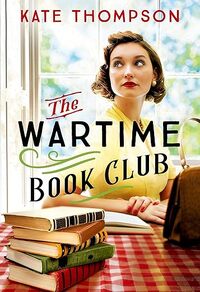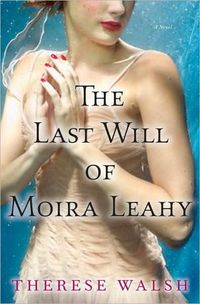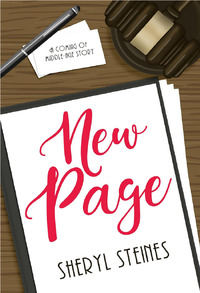 THE WARTIME BOOK CLUB |
 April's Affections and Intrigues: Love and Mystery Bloom |

Purchase
Shaye Areheart Books Romance Romantic Excerpt of The Last Will of Moira Leahy by Therese WalshProdigy I lost my twin to a harsh November nine years ago. Ever since, I’ve felt the span of that month like no other, as if each of the calendar’s thirty perfect little squares split in two on the page. I wished they’d just disappear. Bring on winter. I had bags of rock salt, a shovel, and a strong back. I wasn’t afraid of ice and snow. November always lingered, though, crackling under the foot of my memory like dead leaves. It was no wonder then that I gave in to impulse one November evening, left papers piled high on my desk and went to where I’d lost myself in the past with a friend. I thought I might evade memory for a while at the auction house, but I slammed into it anyhow. It was just November’s way. Only this time, November surprised me. -- I had to have it. Just over a foot long, the wavy dagger looked ancient and as though it’d been carved from lava rock. The grooved base was a study in asymmetry, with one end swooping off in a jagged point and the other circling into itself like a tiny, self-protective tail or the crest of a wave. Gemstones filled a ring that bound metal to a cocked wood handle. Intricate engravings covered the silver sheath. If not for a small hole in the blade’s center, it would’ve been flawless. I leaned in to touch it but was jarred out of my study by a poke to the thigh. The poker, a little girl, almost capsized me, and not from the poking, either. I don’t believe in ghosts, but if I did I might think I was looking at my sister from years past. My sister, a child. Eyes like the sea. Long, red hair like hers--and mine, before I snuffed out my pyrotechnics with several boxes of Platinum Snow and found a pair of scissors. My vision grayed a little as I stared at her. She might’ve been seven or eight--a few years younger than Moira and me when we’d filched a sword like the one I intended to have and lost it in the bay. Well, I’d lost it, pretending to be Alvilda, Pirate Queen. The girl poked me again. "Can I help you, little one?" I asked. "Are you lost?" She didn’t answer, just pointed toward the far back of the viewing table. There wasn’t much there: a bust of JFK, a pearlized candy jar, and an indigo bottle that might’ve been Depression-era glass. Noel would’ve been able to say for sure. "Do you want that?" I took a guess and pointed at the candy jar. Maybe there was a secret stash of chocolate in there; who knew? But she shook her head. I looked again and saw a small black box slathered with pink roses, the buds as sweet as frosting. Of course. "The box?" She nodded. I cradled it before her, and she reached out a hand pudgy with youth. "Careful," I said. I looked for parental figures but saw no one exhibiting missing-child panic--or with the right hair color. The girl didn’t take the box, just left it in my hands and opened the lid. Music swam up at me. "The Entertainer." The girl giggled. "Do you--" My voice turned to rust. "Do you like music?" "I love dancing to the music." Her voice was sweet, as shy as her smile. She was so much like Moira, but whole, able to run and laugh. I missed my sister’s laugh--maybe most of all. "Do you play any instru--" "Jillian! There you are!" A woman with dark hair strode toward us, her face a combination of annoyance and relief. "I was looking at the music, Mommy," the girl said. "See how pretty?" The mother bent before her daughter. "You scared me. Next time you want to look at something, we’ll go together." The girl nodded, serious, just as the lights flickered. "Let’s find a seat." The woman pulled her daughter behind her as the girl lifted her hand to me. Good-bye. They disappeared in the crowd. I shook off my melancholy thoughts and turned back to the blade. My fingers itched to touch it, but just as I reached, an auction attendant pulled it off the table, sheathed it, and placed it in a cardboard box. "Viewing time’s over," she said. "But--" "Fallen in love, have you?" I’d never seen another blade like the one I’d lost to the sea, and the desire for it tugged at me as if a line were rooted in my mouth. "I have to have it." The woman added items to her container: the blue bottle, the candy jar, the music box. "You’d better get out your checkbook, then. Old George thinks that sword will go for hundreds." Fine, then. I had a checkbook. After a few minutes of dodging elbows and purses, I registered as the temporary owner of one beat-up paddle (number 51). Snippets of conversation danced around me as I wedged my way between wide-shouldered men and women. "John would love that old clock for Christmas." "Let’s get through Thanksgiving first." "Thanksgiving’s just a day. Christmas is an event. Besides, it’s never too soon to buy for Christmas. Don’t you think he’d love that clock?" I veered away from them, closer to the stage. That stage and the old floor, pockmarked from where rows of shabby velvet seats used to reside, were all that remained of the theater that had once been a revered landmark in Betheny, New York. At least, that’s what Noel had told me. I’d only been a resident since college. I’d just reached the front when George Lansing, the owner of Lansing’s Block, appeared center stage. There was a blur of activity--the sale of someone’s stamp collection, a worn set of stools, a mahogany china closet that would break backs. I saw the blue bottle poking out of its container at George’s feet and knew the blade lay there as well. The bottle sold, and then George grasped the music box. "Going once!" he said, after a token amount of haggling with the crowd. A middle-aged woman with a sour expression had raised her marker and placed a bid of $5. Where was the girl? Wouldn’t her mother buy the box for $6? I looked around but didn’t see her. "Going twice!" My arm lifted almost of its own volition. "Ten dollars." George didn’t even look at me, probably just wrote the bidder off as a sucker. There were no further offers. I didn’t need a music box. I didn’t want a music box. In fact, I’d hate that music box. But the child who looked so much like my sister should have it. I couldn’t seek her out, though, because just then George held the sheathed dagger over his head, and the raucous room grew hushed. I leaned closer; everyone seemed to. "Now here’s something you don’t see every day," Lansing said, his voice as gritty as his wares. "This here’s a keris. It’s a little roughed up with a hole through its middle, but not bad shape when you consider it was made somewhere in Indonesia probably two centuries ago." Somewhere in Indonesia. Probably two centuries ago. I smiled. Lansing had never been big on facts--something Noel had taken profitable advantage of in the past. And then Lansing’s pitch rose, and the chant began: "Who’ll bid two hundred dollars, two hundred dollars, two hundred dollars?" It seemed half the room’s occupants held their markers high, and the price rose to $225, $250, $275. I gripped my marker with slick palms. Noel had taught me how to bide my time, to don a face as still as the water on a windless bay; the slightest ripple would attract Lansing’s attention. "This blade’s worth at least double that last bid, and I won’t sell it for anything less than $350!" He pounded the podium--a technique that probably wasn’t in the Christie’s handbook, even if it did work. I looked over my shoulder as number 36 grumbled his bid of $350. How much was I willing to spend in honor of a memory? "Going once for three hundred and fifty dollars, going twice!" I raised my marker and hollered, "Four hundred dollars!" George finally looked at me, and his speck-dark eyes grew wide. "It’s Noel Ryan’s friend, the little albino girl," he said with a smirk. He eyeballed the room, but Noel wouldn’t be found here tonight. "He send you for this?" "No," I said, "he didn’t." Little albino girl. Times like this I just wanted to shout out that I, Maeve Leahy, was in fact a professor and connoisseur of more languages than George Lansing could probably name. But I said nothing, just tried to skewer him with my most lethal stare as people turned to look at me and my hueless hair. He smiled as he waved the gilded carrot that was Noel’s impeccable reputation and keen eye before the crowd, and didn’t blink when the false bait drew bites and the bidding resumed. My Irish kicked in when it was down to me and another persis- tent soul, someone who pressed on from the back of the room. I had to have the blade, so I would have it. I lifted my marker and tried not to think about the cost. But the other bidder didn’t relent, either. "You?" George Lansing said with incredulity the first time number 12’s marker was called out. After, he just glowered at whoever gave my checkbook and me such a run, which was curious in and of itself. I craned my head to pierce my competitor with dagger eyes, to say, Back off. This is mine. But I couldn’t stand tall enough to see a face, just the competing placard and an odd black hat on a short-statured body. I was no fashionista, but the hat looked like a pillbox wrapped in a scarf. None of it mattered in the end. Once the price teetered up to $700, not even Lansing could coerce blood from the others’ snapped shut, firm-tucked, copper-pinching veins. So I won. The tautness in my chest loosened as I made my way to the pay-and-pickup window. I might’ve forgotten about the music box, but the woman behind the counter quoted me $710, and handed it over straightaway once I’d written out the check. Excerpt from The Last Will of Moira Leahy by Therese Walsh |
|
| |||
|
||||



 © 2003-2024
© 2003-2024